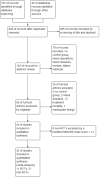The 30-year experience-A meta-analysis of randomised and high-quality non-randomised studies of hyperthermic intraperitoneal chemotherapy in the treatment of gastric cancer
- PMID: 28456089
- PMCID: PMC5568419
- DOI: 10.1016/j.ejca.2017.03.030
The 30-year experience-A meta-analysis of randomised and high-quality non-randomised studies of hyperthermic intraperitoneal chemotherapy in the treatment of gastric cancer
Abstract
Importance: Hyperthermic intraperitoneal chemotherapy (HIPEC) has been used within various multimodality strategies for the prevention and treatment of gastric cancer peritoneal carcinomatosis.
Objective: To systematically evaluate the role of HIPEC in gastric cancer and clarify its effectiveness at different stages of peritoneal disease progression.
Data sources: Medline and Embase databases between January 1, 1985 and June 1, 2016.
Study selection: Randomised control trials and high-quality non-randomised control trials selected on a validated tool (methodological index for non-randomised studies) comparing HIPEC and standard oncological management for the treatment of advanced stage gastric cancer with and without peritoneal carcinomatosis were considered.
Data extraction and synthesis: A random-effects network meta-analysis.
Main outcomes and measures: The primary outcomes were overall survival and disease recurrence. Secondary outcomes were overall complications, type of complications, and sites of recurrence.
Results: A total of 11 RCTs and 21 non-randomised control trials (2520 patients) were included. For patients without the presence of peritoneal carcinomatosis (PC), the overall survival rates between the HIPEC and control groups at 3 or 5 years resulted in favour of the HIPEC group (risk ratio [RR] = 0.82, P = 0.01). No difference in the 3-year overall survival (RR = 0.99, P = 0.85) in but a prolonged median survival of 4 months in favour of the HIPEC group (WMD = 4.04, P < 0.001) was seen in patients with PC. HIPEC was associated with significantly higher risk of complications for both patients with PC (RR = 2.15, P < 0.01) and without (RR = 2.17, P < 0.01). This increased risk in the HIPEC group was related to systemic drugs toxicity. Anastomotic leakage rates were found to be similar between groups.
Conclusions: Our study demonstrates a survival advantage of the use of HIPEC as a prophylactic strategy and suggests that patients whose disease burden is limited to positive cytology and limited nodal involvement may benefit the most from HIPEC. For patients with extensive carcinomatosis, the completeness of cytoreductive surgery is a critical prognostic factor for survival. Future RCTs should better define patient selection criteria.
Keywords: Gastric cancer; HIPEC; Hyperthermic intraperitoneal chemotherapy; Peritoneal carcinomatosis.
Copyright © 2017 Elsevier Ltd. All rights reserved.
Figures




References
-
- G Estimated cancer incidence, mortality and prevalence worldwide. 2012 http://globocan.iarc.fr/Pages/fact_sheets_cancer.aspx; accessed August 10th, 2016.
-
- Verwaal VJ, van Ruth S, de Bree E, van Sloothen GW, van Tinteren H, Boot H, et al. Randomized trial of cytoreduction and hyperthermic intraperitoneal chemotherapy versus systemic chemotherapy and palliative surgery in patients with peritoneal carcinomatosis of colorectal cancer. J Clin Oncol. 2003;21(20):3737–43. - PubMed
-
- Deraco M, Kusamura S, Virzi S, Puccio F, Macri A, Famulari C, et al. Cytoreductive surgery and hyperthermic intraperitoneal chemotherapy as upfront therapy for advanced epithelial ovarian cancer: multi-institutional phase-II trial. Gynecol Oncol. 2011;122(2):215–20. - PubMed
Publication types
MeSH terms
Substances
Grants and funding
LinkOut - more resources
Full Text Sources
Other Literature Sources
Medical

